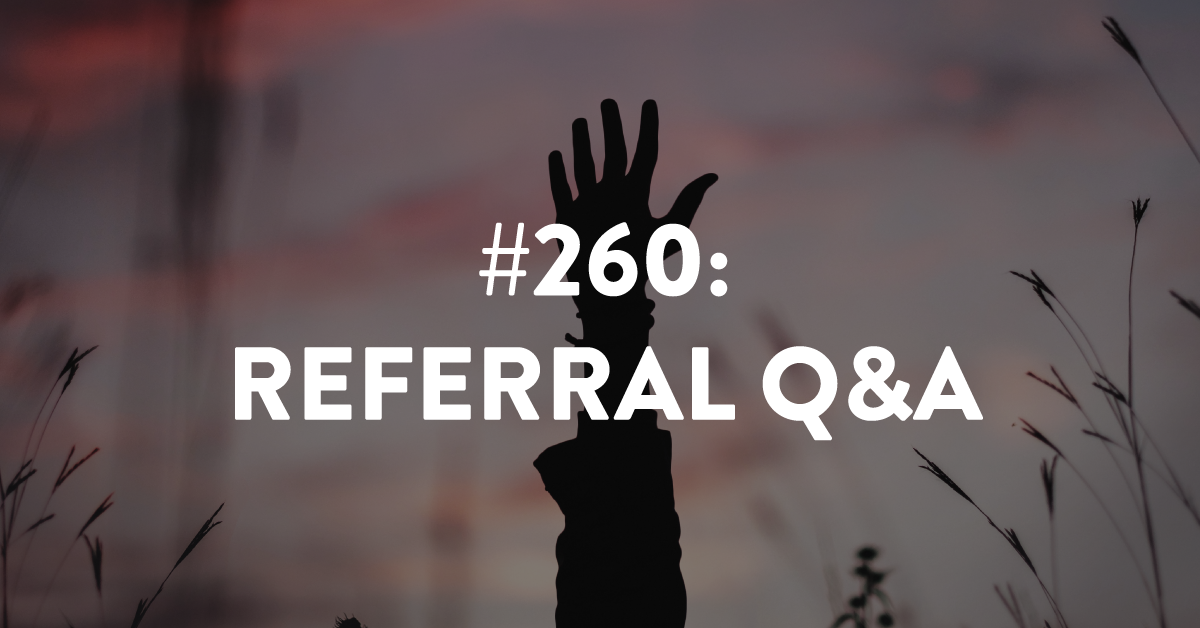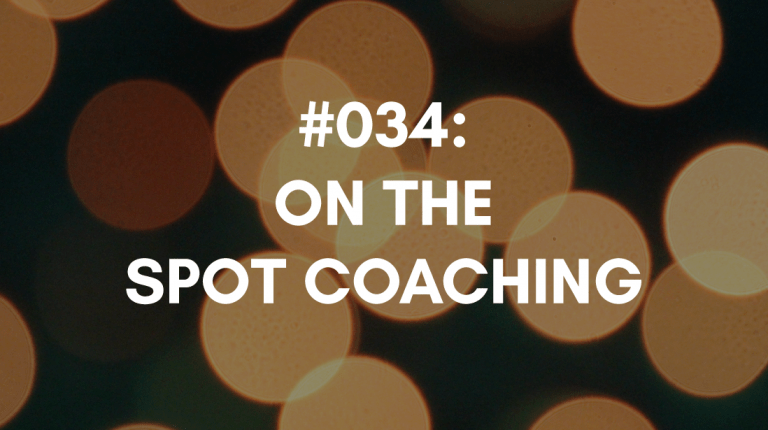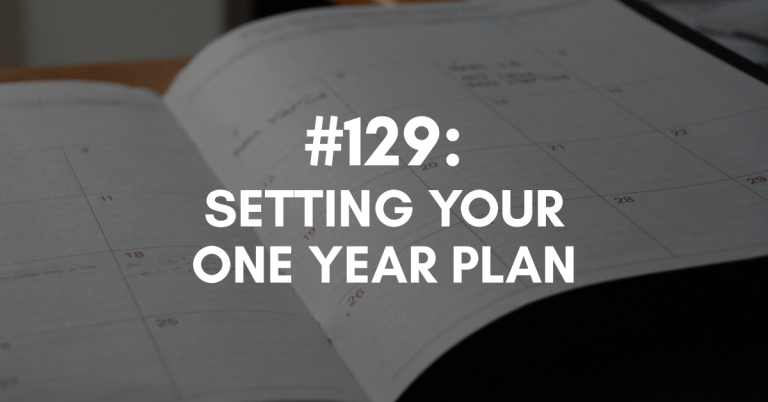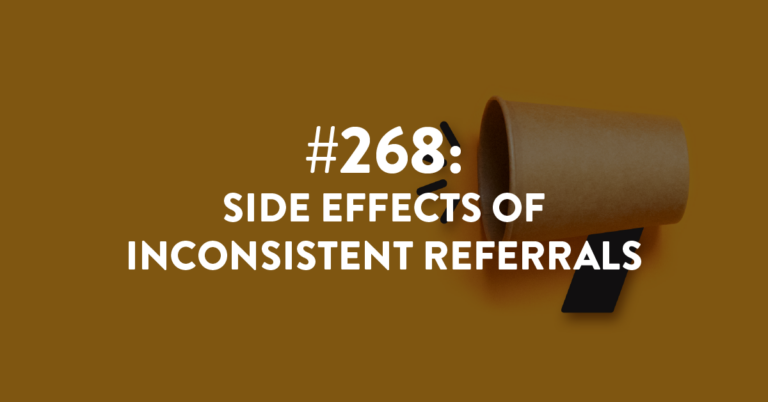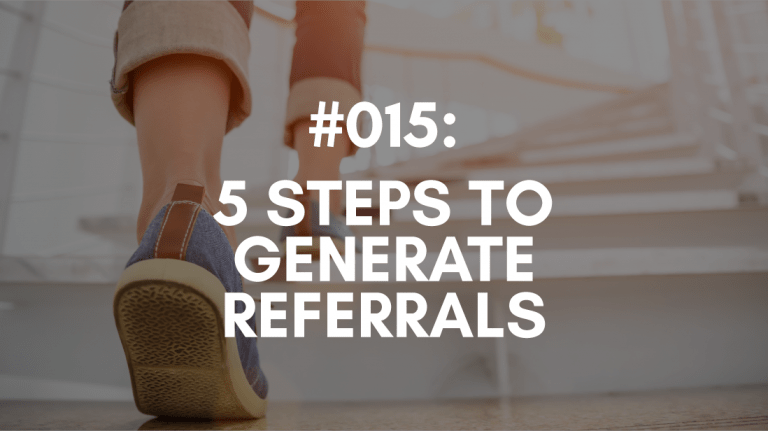Ep #260: Referral Q&A
Imagine this: someone tells you they will refer you, but it doesn’t happen. In this Q&A episode, I tackle a question I received after one of my recent presentations, which is “When people say they will refer you but they never do, are you doing something wrong?”
Get ready as we dissect this question from three different angles, uncovering actionable strategies along the way.
Well start with the elephant in the room and tackle the intentions behind their words. Did they genuinely mean it, or was it said for another reason?
Then we’ll examine whether referring you is really even possible for them, meaning… does it even makes sense for them to follow through. And remember, the timing of their referral might be entirely subjective, so we discuss how to leverage that ambiguity to your advantage.
I also share a powerful technique to cultivate relationships with those who express their intention to refer you. Discover the art of nurturing connections, planting referral seeds, and fostering a strong bond that encourages them to take action.
Links Mentioned During the Episode:
Is it time to get serious about joining Building a Referable Business™ (BRB)? First step is to submit your application BRB to see if you’re a fit.
Next Episode:
Next episode is #261, and we kick off our summer series!
Download The Full Episode Transcript
Read the Transcript Below:
Stacey Brown Randall: Question for you: how do you respond when someone tells you that they will refer to you? My answer may surprise you.
Hey there, and welcome to episode 260 of the Roadmap to Referrals Podcast, a show about helping you build a referable business. I’m your host, Stacey Brown Randall.
This being episode 260 means that it’s a 10th episode, and pretty much for every 10th episode we do a question-and-answer episode, meaning listeners like yourself and other people that message me on social media or ask questions during presentations and sometimes, the folks within my coaching program with the questions they ask, we take those questions, compile them, and I answer them every 10th episode.
So, for this Q&A episode, I’m actually pulling a question that I received after I gave a presentation about a month ago. I had a young lady approach me and ask a very loaded question and I was like, “Oh, I’m so excited to answer this question.”
So, for the presentation attendee in that moment, of course, I answered her question, but then I brought that question because I thought it was just so powerful and so loaded that I wanted to share that question and of course, my answer to it with my BRB (Building a Referable Business) coaching members. That’s what BRB stands for, Building a Referable Business, it’s our coaching program.
So, I wanted to take this question and I wanted to share it with my BRB coaching members. I mean, it was just such a good discussion that we had within BRB as I was providing them my take on this question, and I thought, “Wow, this would actually be a great question for an upcoming Q&A episode.” So, here we are at episode 260 and now, I’m going to share it with you guys, the listeners of our podcast.
So, the question is this, when people say they will refer to you, but then they never do, are you doing something wrong? Let that sink in for just a minute. This is how the question was asked to me. “When people say they’ll refer to me, but they never do, am I doing something wrong?” That’s how the question started.
Now, I unpack this question in three different ways. Like I said, it’s loaded and there’s a lot to discuss. So, I unpack this question in three different ways with three different angles that I want you to consider. And of course, my BRB members in what you’ll hear with this recording, they participate with me in an experiment to actually prove my point. So, let’s go now to that conversation we had as I was answering this very important question.
When people say that they’ll refer me, but they never do, am I doing something wrong? So, I want to unpack this a little bit with you guys because you’ve probably found yourself in a situation where people have said, “Hey, I’ll refer you,” and then they never actually do.
And sometimes we remember that they’ve said it and we wonder why, and sometimes we actually forget that they even said it. But I want to unpack this so you guys can have this conversation for yourself if this happens for you in the future.
So, a couple of things: the first question I always want you to ask when somebody says, “Hey, who can I refer to you or can I refer to you?” The first question I want you to ask is, “Did they mean it?”
Now, I know that’s kind of like, “What, did they mean it? Why would they say it if they didn’t mean it?” The reality of it is, a lot of people do say things they don’t actually mean.
Ever been in a situation where someone says, “Hey, how’s your day going?” And then you start to answer and you know they’re instantly not thinking, it’s just a nicety, they just said it to be polite. “Hey, how you doing? You’re not listening, I’m off to my own self.” Like it’s just a reality.
So, when you ask yourself the question, “Did they mean it?” Here’s some things to consider.
So, the first one is, is it just an end of conversation pleasantry? Like you’ve had a great conversation, you’ve been talking about business, you’ve been talking about life, they’re going to wrap up and they’re like, “Hey, by the way, let me know if I can ever refer to you.” Is it just an end of conversation pleasantry? It could be an end of conversation pleasantry and they mean it. Usually, they don’t, it’s just how they’re wrapping up the conversation.
This is the second thing; do they say it to you to make you feel good because you’ve helped them, or you’ve known them forever or you run in the same circles with the same people and they just feel like it’s the thing they should say. It’s kind of like it’s to make you feel good, but again, did they actually mean it? Will they follow through on any action?
Now, this question was like packed in like these people have been saying they’ll refer me for a couple of years and they’ve never done it, so as you can imagine, there’s a lot to unpack there.
The next thing I want you to consider is, did they say it, so you’ll do the same for them? Did they say to you, “Hey, I’d love to refer you” because they’re hoping you’ll toss the softball back in conversation be like, “Yeah, great, I’d love to refer to you too.” Are they saying it because they want the same reaction or the same action out of you? It’s more like a prompt than it actually is a promise to refer to you.
Okay, I don’t think people innately say things they don’t mean viciously. Like I don’t believe people say things like that and they think to themselves, “I’m just kidding, I don’t mean it.” I think in the moment they’re saying it and there is some truth behind it, unless they’re saying it as a prompt. But I think we say a lot of things that we don’t always follow through on. And so, it’s important to be really aware of when they said it, did they actually mean it?
The next thing to consider is, can they even do it right? There are some people that I’ll have conversations with and I’ll understand who their market is and I’ll understand who their clients are and I’ll understand the circles that they run in. And I think to myself, “That’s not my world.” And it just depends on who these people are, even if like everybody can be your client is not real. We all know that.
But it’s that idea of you like can they even do it? Is that something that they would even do? Like if I’m having a conversation —Kat I’m going to keep picking on you. If I’m having a conversation with Katherine and I know that she knows a bunch of other attorneys and obviously, I work with attorneys, or let me pick on Erin for a minute.
If I am having a conversation with Erin, and I know Erin knows a lot of other people who are travel planners and she’s having great success in this program, I know there’s the potential that she’s going to come across people who are like her who may be like, “How are you getting all these referrals?” Which by the way, she got like 16, I think it was something like that in the first quarter, so she’s already kicking butt this year.
But the reality that is, is that I have to pay attention, do I think they mean it, and can they actually do it? And only you can decide and answer those two questions. I’m constantly paying attention to cues and paying attention to what’s happening and trying to connect dots, it’s just kind of how my brain works. So, these are the things I think about that I want you to think about.
And then the next kind of thing I want you to consider is when somebody says, hey, they’ll refer to you is, I want you to consider what that actually means. Can they do it? Did they mean it? But what does it actually mean to refer to you?
And at that point you guys can drop those people onto your potential referral source list and take them through the process we teach in Referring Machines to cultivate those people naturally into referral sources, because it’s always going to come back to they’re not going to remember they said that if there’s no actual outreach from you guys.
The other thing is, this is where I want you guys to help me with an experiment. So, if you guys will do me a favor and I’ll open up your chats so you can type something in. It’s like you’re going to type in a couple of words. And not you Chris, because I think you’re driving. I’m going to responsible for accidents.
So, here’s what I’m going to do; I’m going to ask you a question and you’re going to answer it in the chat. Do not submit it. I’m going to give everybody a chance to answer the question and then I’m going to tell you to submit it because I don’t want anyone’s answer to like impact what you think about your answer. I want your answer to be your answer and then we’ll all hit submit at the same time, and we’ll see it all populate in the chat because this kind of hits my last piece here, my last point.
When I say this question to you, I want you to think about how you would define it. So, when I tell you … now remember, type in your answer in the chat, do not hit submit until I tell you, okay.
When I tell you “Yes, I will have that to you soon,” how do you define the word “soon?” So, go to the chat, type it in, don’t hit send, don’t hit submit. Just type in how you define “soon,” I’m going to do it too. I’ll have that to you soon, how do you define “soon?” Alright, everybody, give me a thumbs up if you’ve got it typed into the chat, how you define “soon.”
Okay, we got a couple, we’re just going to wait. Katherine, are you good? Have you typed into the chat how you define “soon?” Don’t tell me, don’t hit send, just type it in. Alright, I think we’re ready. Okay, you guys ready? Everybody hit submit, hit send on yours.
Lindsay, oh my gosh, I love your response. She’s like, “No idea. I don’t know what you mean by soon because you didn’t clarify.” So, Andrew says, one to two days, Erin says in the next 24 hours, Iye said in a couple of days, Catherine said in a few days.
We all define “soon” differently. We all do it. Unless it’s clarified for us, we all define soon differently. I want you to think about that as it relates to someone saying “I’ll refer to you.” They never said when, we don’t know if they’ll actually do it. Obviously, we don’t know if they can or if they actually will. And we certainly don’t know how long it’s going to be before it happens.
In particular to this young lady who asked me this question, hers was like, “They’ve been telling me multiple times a year for years they’re going to refer to me.” And I’m like, it’s like the adage we say soon, and I get to define what soon means for me, but I didn’t tell you what it means for you because we don’t ever really know.
So, when you’re in the situation with someone who is like, “Hey, I will refer to you,” I do want you to be prepared to take advantage of that. I want you to recognize can they do it and did they mean it? And if you think those two answers are yes, the process I want you to put that through, the process I want you to take them through is cultivating them naturally, not just sitting around expecting them to do it, and then you being like, “Wait, they said they do it. Yeah, but they didn’t really define when or how or if they actually would.”
I think for most people it’s a throwaway line, not for everybody. Some people don’t say things absolutely unless they mean it. A lot of people don’t think about it when they say things. So, I just think that was an important one for us to go over.
Andrew said, “I literally answered a client email earlier, starting to type soon, having one to two days in my head and realized we couldn’t do that, so I changed the timeframe.” Yeah, soon means a lot of different things.
I was having a conversation with a real estate company last week that wants me to come to Spokane, Washington and do a presentation in November and they wanted to pick from different presentations and I said, “Okay, I’m going to need a couple of days, as in next week to get that to you,” because I knew there was no way I was going to do it within like a couple of days of last week So, we have to decide.
Okay, so thank you guys for participating. You proved my point, which I very much appreciate. I figured that would happen because we all defined it differently. But does anybody have any questions on that particular piece that we just went over about when people say they can refer you?
I hope you enjoyed that answer, the breakdown, the different angles of how I look at people saying “Hey, I refer you and then they never do.” And I also hope that you participated in our experiment. So, when I was asking my BRB members to define the word soon, I hope that you answered it to yourself as well. And I’m curious, I do wonder how different your answer might have been from our answers that you heard me read through.
I also want to walk you through the reference I made about what to do with people who say they will refer you in terms of how we cultivate them.
Pardon the interruption. Want to participate in conversations like this that you’re hearing on this episode and learn a proven process to double, triple or quadruple your referrals? Then you need to join us inside the Building a Referable Business Coaching Program.
Go to staceybrownrandall.com/referable to learn about everything you receive inside BRB. Learn about all the transformations and awesome case studies and testimonials that are coming from our BRB members, and of course, your first step once you take it all in and say “Hey, this could be for me” is to submit your application.
The link again to learn more about Building a Referable Business Coaching Program and to find the link your application, can be found at staceybrownrandall.com/referable
Okay, so during that BRB conversation that you listened in on, you heard me make a reference that I want my BRB members to cultivate people who say they’ll refer to you by following our process inside the Referring Machine Training. The Referring Machine Training is one of our three foundational strategies that I teach.
Referring machines is how we turn clients and contacts into new referral sources. Meaning we take a potential referral source, someone whose never referred us, we take them through this process that allows them to be able to start referring us if they ultimately will. Doesn’t mean everybody you take through the process will refer. But it means there’s a process for you to follow so you can bring people to place where they be comfortable referring to you.
Now, the Referring Machine Training is included as one of the 19 trainings that our BRB members have access to. So, when you are in BRB you get access to all the trainings and Referring Machines is one of the ones that is included.
But it’s also available as an A La Carte training that you can also decide “Hey I just want to learn this one strategy.” So, it is available as an A La Carte training.
If you go to programs tab on our website which is staceybrownrandall.com, and then you click onto at the website, staceybrownrandall.com, click on programs from the menu tab and then of course, under programs, just click on the self-study option, it’ll bring up the online programs the one for Referring Machines.
The reason I recommended my BRB members to take someone through who says hey, they’ll refer you … like so the reason I recommended to them that I want them to take someone through the training that I teach inside referring machines is because typically, they won’t get around to referring you even if they say it without you cultivating a relationship with them, and learning how to plant referral seeds during that relationship cultivation. There’s some intentionality you have to bring to this.
Now, here’s what’s very, very different and sometimes shocking to people when they get into the referring machines training. There’s this myth or this thought process that people have that I teach you like how to talk to someone about your business and I teach you how to talk to someone about who they should refer to you and what referring to you looks like. No, none of that, all of that’s wrong.
Most people teach, hey if you want people to refer to you, you going to tell them to refer you, you going to ask them to refer you, and then you are going to tell them how to do it. Absolutely not, that’s actually not what brings someone to the place where they ultimately want to refer you and enjoy it so they keep referring you.
So, the philosophy and process that we follow within Referring Machines is completely backwards from what you’re probably expecting in a training like that. So, it works backwards from what you expect to cultivate people into referral sources who’ve never referred you before.
But that’s because as you know, if you’re a long-time listener of this podcast or you’ve been following me for a while, you know we base every strategy and tactic, and every piece of language that we teach based on the science of how someone’s going to respond in a way that protects the relationship you have with them.
So, we would never teach you to try to train somebody on how to refer to you. Like that is no, so wrong, we would never do that. What we do teach you is how to cultivate that relationship, make that relationship about them and the ways that you do that from an authentic and a genuine place while also recognizing the language, the referral seeds that you can plant throughout that process.
Most people don’t ever think about it like this, but when someone makes the decision to refer to you, they kind of want it to be their decision, not you giving them that idea. So, we work off of that premise and how we cultivate people.
So, I know Referring Machines for most people who go through it, they’re like, “Wow, this is backwards.” And then they do it and they’re like, “But gosh, it feels so good, I feel like am being a nice kind human. I’m just taking care of people and look, now I’m getting referrals.” So, it’s really awesome how it works.
You guys heard a couple episodes ago, I think it was episode 253, we had Phoebe Pressler on the podcast and she was talking about her early 90-day success that she had and she was talking about how she had received 15 referrals in 90 days, and she only wanted 20 for the year and she’s already added 15 in the first 90 days and four of those came from brand new people she had cultivated into referral sources following the process in referring machines.
So, it is backwards on purpose because you know what? If I’m being super selfish and honest here, it’s because I want to feel good doing it too. And so, a lot of things are just built around let’s be a good human.
So, when you heard that reference inside that recording, I just wanted to put it into context for you because I didn’t have to explain it to my BRB members because they know it and get it. But I thought for you guys as the listeners of the podcast, that context would probably be helpful after you listen to me answer that question and kind of tell them the solution.
I wanted to just explain the solution for you guys as well with a little bit more details, particularly if you are not obviously a client of mine, not in BRB or don’t have access or haven’t invested in the referring machine training as well. So, there you go.
Alright, we had one other quick question that came up that I’m going to answer lightning fast. And that question is: “What is the summer series topic?”
I’m super excited for our series topic this summer. So, if you are new around here, then you probably don’t know that every summer, we pick a topic and I kind of go deep into it over the course of a number of weeks throughout the summer.
Typically, that topic is not on referrals just to mix it up a little bit. So, for those of you who show up every Tuesday and you’re like, “I need my referral fix from Stacey,” during the summer series you get a different fix. We talk about different things.
So, in the past, we have gone in depth about business development, like ways to develop your business outside of referrals. We have talked about the client experience, which of course, definitely relates to referrals, but we’ve gone deep with the client experience as well and so, we have fun with this every summer and we’re kicking off.
We’re actually kicking off with our summer series coming up right away. And so, for that question, I want to go ahead and give you a spoiler alert, which you’ll hear more about it in the next episode as well.
But this year for our summer series topic, our focus is on talking about the mindset of a business owner, meaning the mindset you need to enjoy this journey we call business ownership. So, I’m so excited, I’ve got some great experts that I am bringing in to talk about this from a lot of different directions.
Like I have started learning about this stuff more and more over the last two years, and I’m so excited about the group of humans that I have pulled together for this series. They are going to drop some knowledge on you and hopefully get you thinking differently about your own mind and the way you think because you need a strong, healthy, supported mindset if you are making the decision to be a business owner, most definitely.
So, of course, show notes link for this episode is staceybrownrandall.com/260. You can find the links that we mentioned in the episode on the show notes page. And of course, next week is episode 261, and that is when we’re kicking off our summer series on the mindset of a business owner.
But until then, you know what to do, my friend; take control of your referrals and build a referable business. Bye for now.

